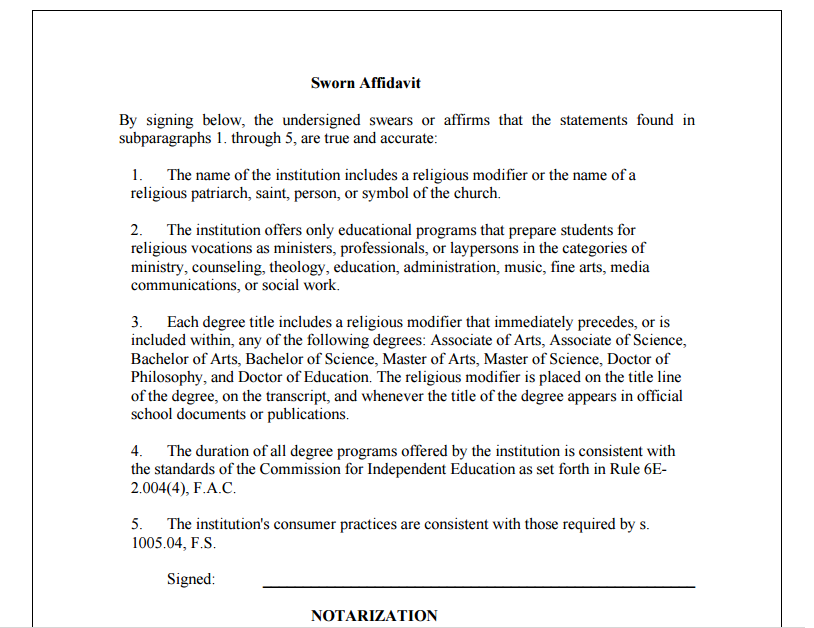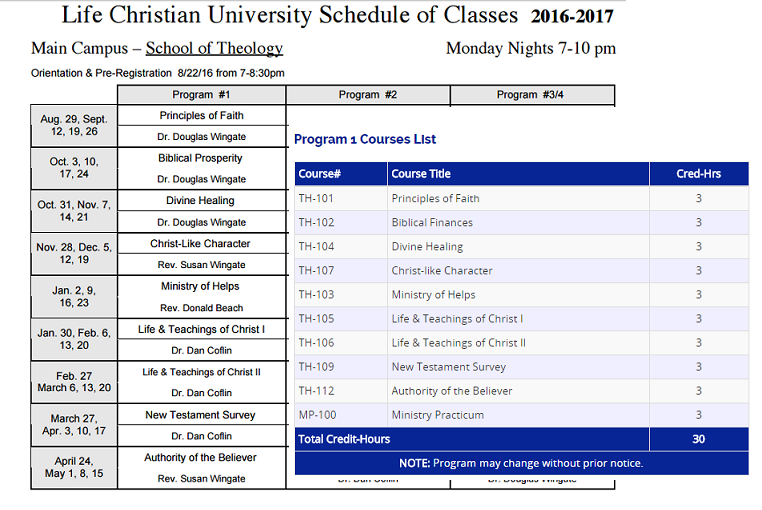Recently, Christian Today posted an article about mega-evangelist Joyce Meyer’s and self-styled historian David Barton’s PhD degree from Life Christian University. In it, LCU’s president Douglas Wingate was quoted in support of his school’s work. I have obtained the entire statement and am posting it here.
I began looking into LCU when David Barton posted a video boasting about having an earned doctorate. The next day he removed the video and has not mentioned his PhD since. Although Barton points to the diploma while on camera, the identity of the school is hidden by one of his honorary degrees. Through enlarging the screen, I was able to determine that the source of the degree is LCU. In this statement, Wingate confirms the source of the degree. Given the statement Wingate provided, the description of the degree as being earned doesn’t seem accurate.
For background on the issue click here, here, here, here, here, here, and here.
Life Christian University’s position on earned, matriculated and honorary degree’s (sic)
Life Christian University is a ministry education institution that is designed to provide training for future ministers who desire to “rightly divide the word of truth” as described in the original doctrines of the New Testament. Though many professing Christians assume that their positions reflect what the Bible teaches, if they alter the operation of the Church and it’s theology in any fashion that does not resemble the miracle power and glory of the first century church, they are missing much of what is available to the born again believer.
Because of this disconnect with much of modern Christendom, LCU receives criticism from parts of the Church, and certainly from the unsaved people of the world system who criticize Christian academics altogether. Life Christian University is not moved for a moment by any criticism from those who simply do not qualify to comment on our beliefs and practices due to their spiritual ignorance, but we validate every position we teach through deep study of the Word of God, without religious influence.
For those who question the legal status of our operation, Life Christian University is exempt from licensure in the state of Florida, but does submit to the laws governing religious institutions with annual verification of compliance with the Commission for Independent Education, a division of the Florida Department of Education. Within this structure LCU provides ministry education in various spiritual disciplines for earned degrees at its main campus in Tampa, Florida and through licensing its curriculum to educationally qualified remote locations in various churches throughout the US and many foreign countries. LCU also offers an online program delivered from the main campus faculty, and available to anyone through the cyber-world who can access our web site and study in English. Our first course is free and available for anyone to view and listen to the lectures and read the free online textbook. Enrollment is not required in order to study the first course.
It seems that questions have arisen concerning various well-known ministers of the Gospel who we refer to as Distinguished Degree holders. These ministers are not graduates of LCU but are those for whom we recognize the comparable academic work in their published teaching materials, many of which we use as texts in our university, and we have matriculated degrees for their work. As with any regularly enrolled student, when we do an assessment on the former education that a student desires to transfer into LCU, we consider any former Bible School credit, liberal arts school credit, Bible School teaching credit and Published Works credit. It is a common practice for even secular liberal arts institutions to offer Life Experience credit.
When a minister has enough credit beyond their customary transfer credit, LCU is able to matriculate degrees for each of the various levels of credit. The first degree is the Bachelors degree, then the Masters degree, then the Doctor of Ministry degree and finally the Ph.D. The necessary credit hours of study that match these degrees is 120 credits of undergraduate study for the Bachelors degree, 36 credit hours of graduate study for the Masters degree, 15 hours of post-graduate study plus a 30 credit dissertation for the D.Min. and 15 hours of post-graduate study plus a 30 credit dissertation for the Ph.D. Again, these degrees may consist of transfer credit, and previously published works. This work, of course, must be for that which falls into the disciplines traditionally offered by the university, but an exception can be made for some work that is outside of, but related to those disciplines. One such discipline would be in Christian American History, which falls into the category of Modern Church History. All of the candidates work is thoroughly examined before credit is awarded and it is clearly identified on their transcript. That is certainly the case with Dr. David Barton, whose work in comparison to the revisionist historians, make them look completely foolish.
Some unsaved liberal academics are drastically opposed to our methods of assessment for earned degree credit, but they need only to concern themselves with their own anti-Christian and often Anti-Christ secular schools, which LCU has nothing in common with. Unfortunately in America, many of these institutions were founded as colonial seminaries, and early American seminaries. It is a tremendous blight on our nation that these secular education institutions have fallen so far from the grace of God, and are now tools of the enemies of God. The pendulum seems to have swung from godliness all the way to demon possession.
When critics complain about the independent, non-government accreditation that we have obtained, as opposed to secular government accreditation, my question is, “Why should the ministry education institutions subject themselves to unbelievers for academic oversight about education that they are absolutely ignorant of?” You wouldn’t ask a prostitute for their opinion on whether or not a virgin should remain pure until she is married. Neither should we subject ourselves to the scrutiny of the spiritually ignorant.
We do not offer any liberal arts in our programs, nor are we in competition with any liberal arts institutions, and therefore do not receive any government monies for our educational programs. In a way you could say we also believe in the separation of church and state. We simply believe that the state should not be involved in the church’s ministry education. In reality, since the first institutions of higher learning in America originated in the church, it seems that the liberal arts institutions should have to come to the church for accreditation. It would certainly change things if they had to meet our standards of spirituality and morality.
Finally, LCU does offer Honorary Degrees to some highly experienced ministers who do not have the formal education, but certainly have the equivalent ministry education, obtained on their own in a non-formal setting. A few of our distinguished degree holders fall into this category. The degrees that they have received are customarily the Doctor of Divinity degree, or Doctor of Sacred Music degree.
In answer to the question about whether we should change the status of our matriculated degrees to honorary degrees, the answer is emphatically, no. It is simply imprudent to compare apples to oranges, and the function of ministry education institutions do not compare to the lower forms of education offered in the secular liberal arts institutions. Those institutions should simply continue doing what they do, and we will simply continue doing what we do.
One day we will all stand before the judgment seat of Christ and be face to face with Jesus himself. Believers will stand before him to receive our rewards for faithfulness to His call on our lives, and unbelievers will face him as Judge, jury and executioner. Then all of these questions will be eternally put to rest.
In his service for a quality, spiritual education,
Dr. Douglas J. Wingate
President and Founder
Wingate claims that Barton’s work in “Christian American History” falls under the category of “Modern Church History.” Wingate has to do this because LCU is only allowed to give degrees which have a religious word in the name and train people for work in the church. I would like to see Barton’s LCU transcript to see what experiences and books were counted as credits. Was The Jefferson Lies counted? How about Original Intent? Barton means these books to make authoritative claims about American history without any reference to religious vocation.
One reason religious schools are exempt from licensing as post-secondary schools is because they are training people to perform religious functions. The state rightly allows churches to determine what training is needed to perform religious duties. However, Barton claims he has an earned degree while purporting to do the work of a historian. If he claims his degree is in some kind of history, a strong case can be made that LCU has gone beyond what it is allowed to do.
In any case, religious or not, the claim that the “Distinguished Degree Holders” have earned degrees is preposterous and misleading. Wingate isn’t fooling anyone. It is time to stop the charade.

